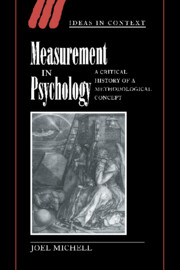Book contents
- Frontmatter
- Contents
- Preface
- Acknowledgments
- 1 Numerical data and the meaning of measurement
- 2 Quantitative psychology's intellectual inheritance
- 3 Quantity, number and measurement in science
- 4 Early psychology and the quantity objection
- 5 Making the representational theory of measurement
- 6 The status of psychophysical measurement
- 7 A definition made to measure
- 8 Quantitative psychology and the revolution in measurement theory
- Glossary
- List of references
- Index
- IDEAS IN CONTEXT
2 - Quantitative psychology's intellectual inheritance
Published online by Cambridge University Press: 22 September 2009
- Frontmatter
- Contents
- Preface
- Acknowledgments
- 1 Numerical data and the meaning of measurement
- 2 Quantitative psychology's intellectual inheritance
- 3 Quantity, number and measurement in science
- 4 Early psychology and the quantity objection
- 5 Making the representational theory of measurement
- 6 The status of psychophysical measurement
- 7 A definition made to measure
- 8 Quantitative psychology and the revolution in measurement theory
- Glossary
- List of references
- Index
- IDEAS IN CONTEXT
Summary
Whatever exists at all exists in some amount. To know it thoroughly involves knowing its quantity.
(Edward L. Thorndike)This is only to ring changes on words, and to make a show of mathematical reasoning, without advancing one step in real knowledge.
(Thomas Reid)If we view the present through lenses partly constructed by the past, then clearer vision comes through locating the historical conditions shaping them. I have talked with psychologists so convinced of their own clearsightedness that they claimed not to comprehend even the possibility that psychological attributes might not be quantitative. Yet the merest acquaintance with the history of science shows that quantitative thinking has not always held sway. Kuhn's (1970) picture of the history of science as a succession of conceptual convulsions may hold a germ of truth but it is one distorted by his conviction of radical discontinuity in the flow of ideas. Superficially, conceptual discontinuities appear in the history of science, but these disguise deeper continuities. The thesis that nature sustains quantity and measure, which has flowed through Western thought since at least Pythagoras, has a trajectory surfacing here, submerged there, here combining with other ideas, there in opposition to dominant trends. Intellectual currents, being propositional, interact in logical ways. Some of the tensions in the history of ideas happen because of the tensions created when there is a confluence of contradictory intellectual currents.
- Type
- Chapter
- Information
- Measurement in PsychologyA Critical History of a Methodological Concept, pp. 24 - 45Publisher: Cambridge University PressPrint publication year: 1999

